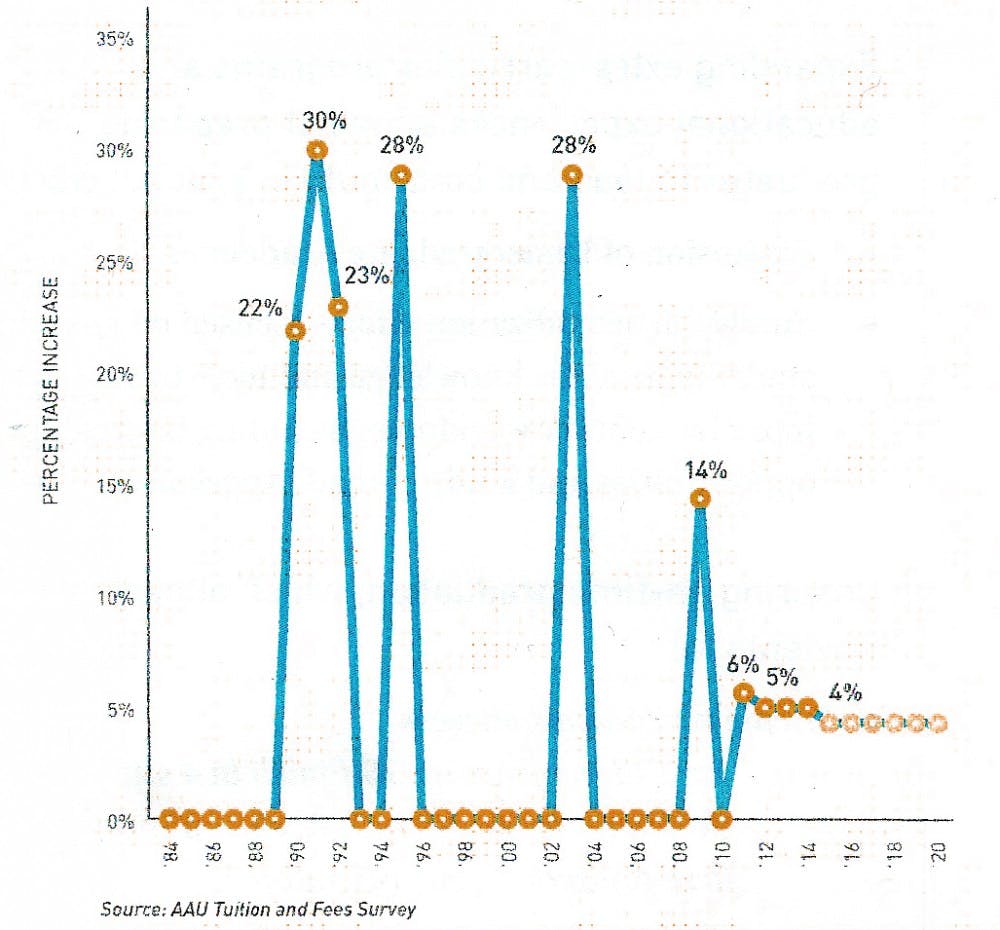Imagine if your tuition shot up 30 percent next semester.
That was a reality for UB students back in the early 1990s and throughout the 2000s when no tuition cap increases were put in place.
In a span of five years – starting in 1990 – tuition at least doubled. It could be maddening situation for students planning out their expenses, and it’s why SUNY is pushing to renew a plan they’re calling “rational tuition.”
UB’s tuition rates will increase $300 – or roughly 4 percent – every year for the next six years. That’s the maximum amount UB can increase its tuition annually, due to NYSUNY 2020, which limits SUNY campuses to $300 tuition increases annually.
That plan is set to expire after next academic year, though, so SUNY is currently looking for student input on its renewal.
NYSUNY 2020 was signed into law by New York State Gov. Andrew Cuomo in 2011 and is a five-year plan that allows all 64 campuses to implement the “rational tuition plan” that set limits on annual tuition increases. The plan will have to be renewed by the state legislature after next year, so SUNY is currently looking for student input and feedback on its effectiveness.
Currently, full-time UB students pay about $7,370 between tuition and additional fees.
The Student Association Assembly will hold a student forum on the rational plan with A. Scott Weber, senior vice provost of Academic Affairs, on Wednesday at 6:30 p.m. in Student Union 145E. The SA Assembly officially endorsed renewing the plan for UB student body in a meeting on Feb. 25.
“At face value it can look like we’re endorsing raising tuition raises … that’s not what rational tuition is,” said SA Assembly speaker Melissa Kathan. “So, without rational tuition, tuition rates could change at any time at any given amount. This way you’re able to plan for it and you’re able to see the numbers for the next few years and you can plan for that financially.”
UB’s tuition increased more than 20 percent in single year five times from 1990 to 2003. The tuition has increased five of the past six years, but never by more than 14 percent (in 2009), and never by more than 6 percent since NYSUNY 2020 went into affect in 2011. The annual average SUNY tuition increase was 6.7 percent from 1991 to 2011. UB’s was 6.45 percent.
UB’s tuition has increased by 21 percent since the passage of the bill in 2011, and by the end of 2020, it will have increased 45 percent since the implementation of rational tuition.
“It’s pretty clear that’s why the name ‘rational’ was developed. We would have these long periods where nothing occurred with tuition changes, and then we would have these incredible spikes,” Weber said.
Weber said the high tuition increases made financial planning difficult for students. He said NYSUNY 2020 has given students assuredness that the tuition will not increase too much, as SUNY schools can only increase tuition $300 in a single year.
Weber also said that before NYSUNY 2020, a lot of the revenue generated from tuition increases went to Albany. He said with NYSUNY 2020, the revenue stays on campus.
“Those tuition increases, modest as they are, still stay on campus for the betterment of our students,” Weber said.
According to UB officials, the revenues generated since the passage of NYSUNY 2020 in 2011 until the end of 2014 went to hiring 277 new faculty, funding a “successful” Finish in Four program, 10,000 additional course seats, 300 new class sections, more academic and financial aid advisors, investing $6.77 million in need-based financial aid.
Officials also said the four-year and six-year graduation rates have increased since the passage of NYSUNY 2020.
Stony Brook and Oneonta’s student governments have also passed referendum votes to endorse the rational tuition plan, according to Kathan. SUNY Speaks Up, an advocacy day, will be held in Albany on March 24 and will allow students to discuss “important education concerns with our New York State legislatures,” according to SUNY Student Assembly’s website. Kathan said all SUNY students are invited to the event.
“That is our huge day where the legislature knows were coming, we have key points that we know students care about and want to address,” Kathan said.
Kathan said UB also wanted the SA Assembly’s endorsement because UB administrators will be going to Albany sometime this month to advocate on behalf of students about the rational tuition plan.
“They were hoping it would be in time for that so they could give some opinion on this because it is a huge issue within the legislature,” Kathan said.
The student forum on rational tuition will be held on Wednesday, but some members of the SA Assembly felt they should have put it on before they voted to endorse the plan or not.
The four members who voted ‘no’ voiced concerns at Wednesday’s meeting that a student forum was not held before the referendum for them to gage students’ opinion on the plan. Kathan, who is not a voting member of SA Assembly, said the members who voted not to endorse agreed that the rational tuition plan is a good idea, but simply wanted a forum for students before officially endorsing it.
“By nature, SA Assembly members are automatically representatives of the students,” Kathan said. “While some were questioning that at first, it was apparent rational tuition has been a good plan.”
SA Assembly is the largest legislative body in the SA and members do not have to be elected for their positions. They only need 40 signatures endorsing them for the position at the beginning of the semester. Any student is eligible to be a voting member.
Kathan said Wednesday’s forum will focus more on what UB should do with revenue gained through rational tuition.
“It’s really trying to have a forum that students can ask questions about how we invested the money,” Weber said.
email: news@ubspectrum.com





